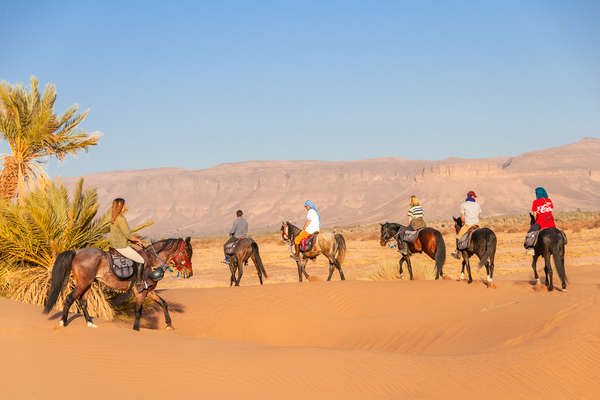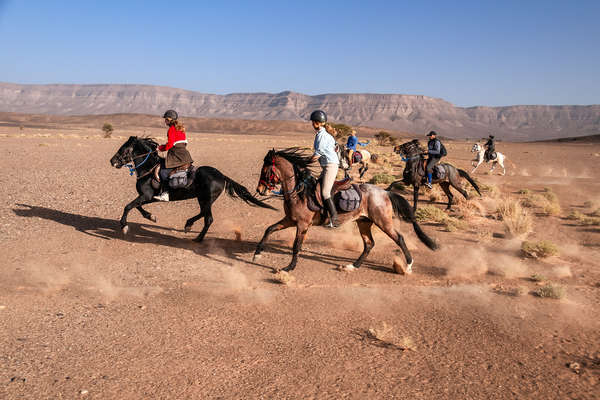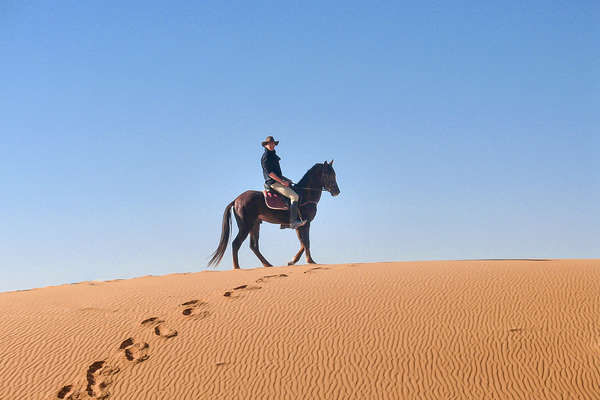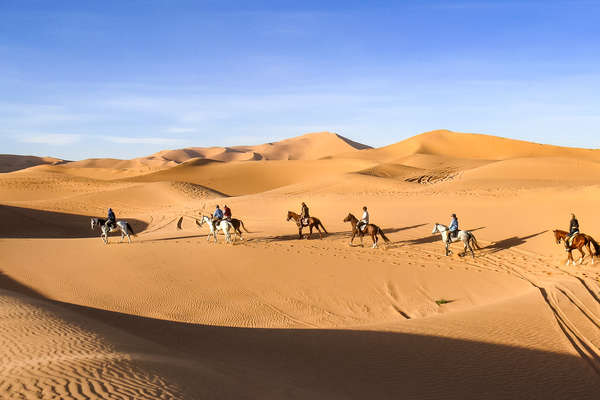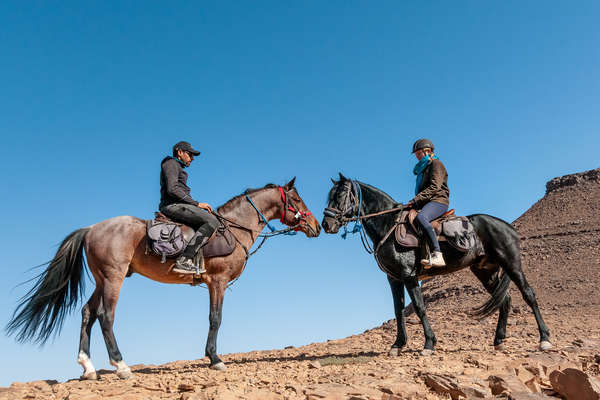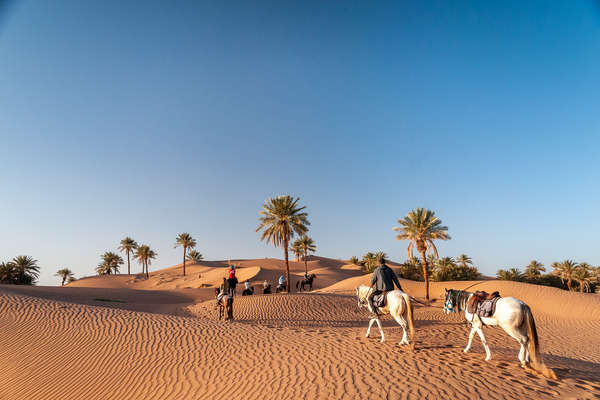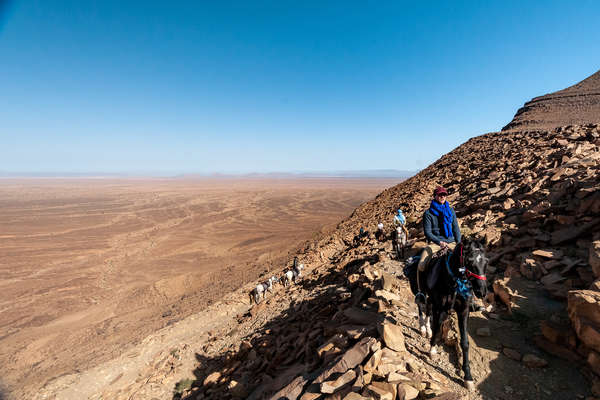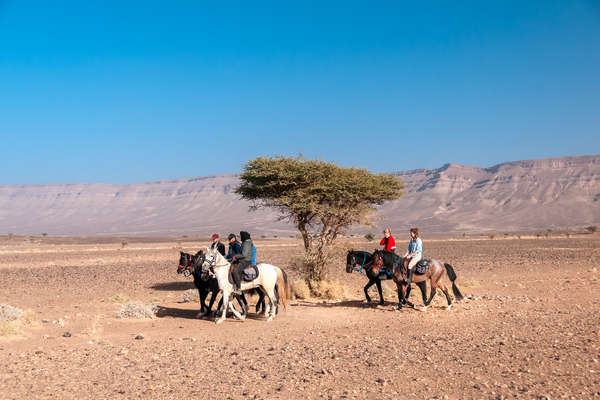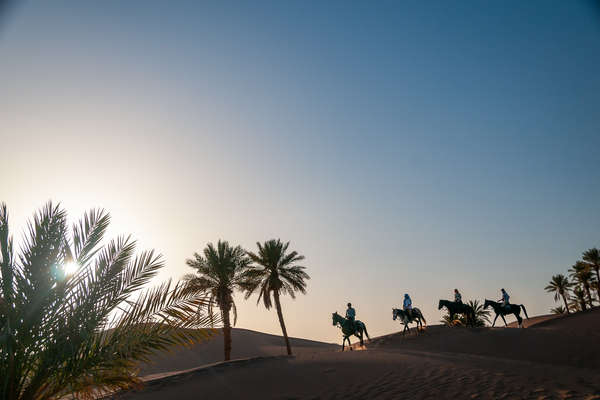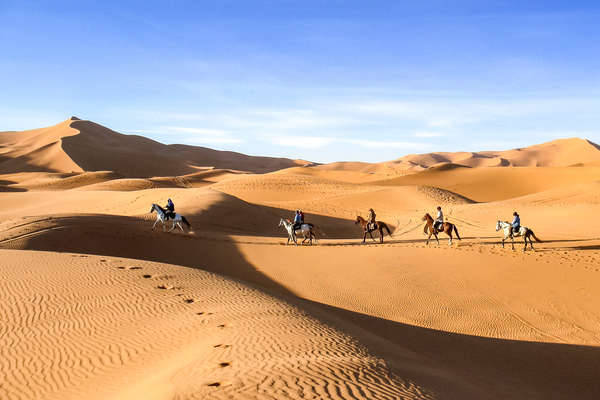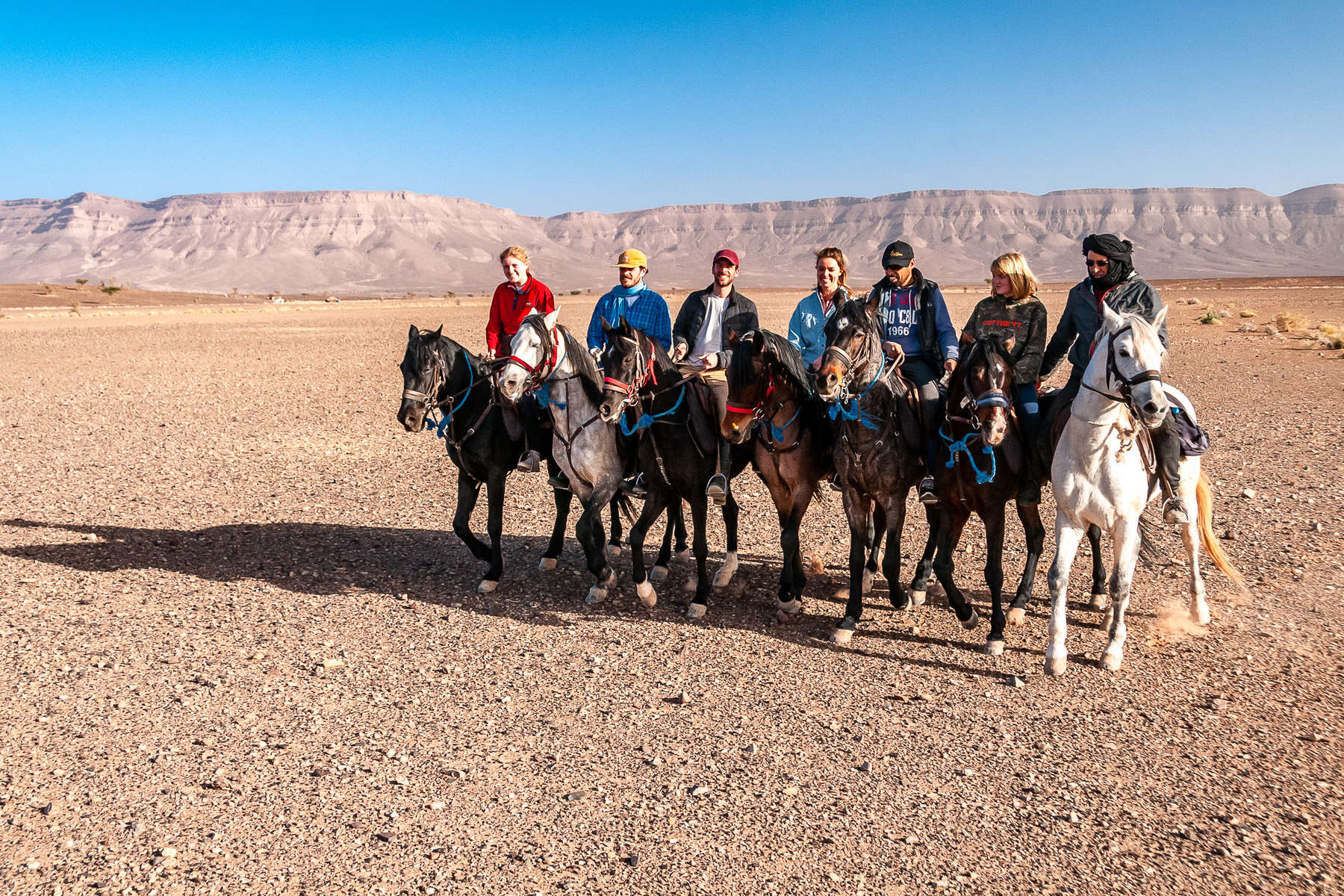
From the horse’s mouth
Itinerary
Highlights
- Experience the mysterious life of the villages nestled in the palm groves of the Draa Valley, one of the most inhabited areas of southern Morocco
- Large, wide open spaces offer plenty of opportunities for faster riding
- The route offers a wide variety of sights to discover: the fortified medina of Oulad Driss, the desert village of Mhamid and the ancient kasbah of Benu
Dates & prices
Price details
- Rates are per person, based on two riders sharing a twin or double room and tent.
- Groups are composed of a minimum of 3 riders and a maximum of 10 international riders, plus guides.
- Please note: the ride will also confirm for 2 riders on payment of a supplement of €750 / £625 / $805 per person. Once the group has reached 3 people, we will remove this supplement from your invoice and refund you if you have already paid it.
- Transfers are included from Ouarzazate, but if you arrive into Marrakesh then there is an additional transfer cost of €150 each way (per vehicle and split between all guests arriving/departing Marrakech). If flying into Marrakech your flight must arrive before 15:30 on day 1 and leave after 14:00 on Day 8.
- If you wish to guarantee single accommodation for the duration of the trip there is a single supplement of €130 / £110 / $140 per person. If you would like to arrange a single tent (but are happy to share hotel accommodation) the supplement is €40 / £35 / $45 per person.
- Certain diets may incur a supplement (gluten-free diets can be accommodated at a supplementary charge of €100/£90/$110 for instance, if you require specific gluten-free supplements). All dietary requirements must be specified at the time of booking.
Please Note
The itinerary may be modified at anytime for security reasons, meteorological or events beyond our control such as blocked roads, rivers in flood, drought, strikes and local holidays. Equus Journeys, our local partners and their local guides will always strive to find the best solution and will alter the itinerary as needed.
The names of the hotels and accommodation are given for information only and depending on availability, they may be modified without notice and replaced by another of a similar standard.
Price includes
Support Team
1 groom
Support Team
1 horse equipped with saddle and bridle per rider
1 vehicle and driver
Inland transports
Private bus or Land rover
Accommodation
Double/triple room in hotel standard 3/4*
Meals
Full board from dinner on day 1 to breakfast on day 8
Additional equipment
Price doesn't include
Meals
Beverages including water at the hotel, and personal extras
Transport
Extra
Small group supplement - see above for the details
Insurance
Optional
Transport
Equestrian info
Horses
Guide & local team
Minimum riding ability
Minimum riding ability
If you weigh more than 90kg or are over 1.95m tall then please contact us to enquire about a suitable horse.
Pace
Tacking ability and participation
Trip conditions and Requested experience
The ascent of the Djebel Bani is physically demanding and require a good head for heights.
Experience of riding a trail of several days would be an advantage but is not required. Riders who do not ride regularly should ensure they are back in the saddle and riding fit before departure.
Visiting a new country offers the opportunity to meet other cultures with different mentalities, therefore it is important to accept these differences and respect the local way of life. 8
Equestrian equipment
Saddlebags are provided.
We recommend our riders to wear a helmet to the correct standard and you should bring your own to ensure a proper fit.
Travel info
Comfort
On the trail you will camp in two-man tents with mattresses. You will need to bring your own sleeping bag. There is a central "caidale" Moroccan tent for meals, a toilet tent and a hot shower tent.
Meals
Breakfast: a light breakfast of bread, cheese, jams, tea
Lunch: an assortment of salads, pasta or rice.
Dinner: soup, tajines, couscous, chicken, and fruit for dessert.
Water is provided on the trail - please bring your own bottle to fill in the mornings. Mint tea is also included. Some guesthouses will offer soft drinks at an extra cost. Alcohol is difficult to find in rural Morocco but is available at the hotel.
Drinks including mineral water are not provided at the hotel.
Special diets can be accommodated, however please note that some foods can be difficult to find in Morocco. Certain diets may incur a supplement (gluten-free diets can be accommodated at a supplementary charge of €100/£90/$110 for instance, if you require specific gluten-free supplements). All dietary requirements must be specified at the time of booking.
Climate
In the Spring and Autumn months the temperatures are pleasantly warm. In October and April the temperatures can be 35c during the day, dropping to 20c at night whilst in November, February and March it is a little cooler (25c daytime and 12c night).
In the heart of the winter (December/January) the mornings and evenings can be cold, as low as minus 5c. At midday the temperatures will be 18-20c can drop rapidly once the sun sets.
In summer it is too hot to ride (45c) and so no desert trails run in the summer.
Tips
Packing list
- Equus Journeys strongly recommend that you wear a riding helmet and that you take your own to ensure a correct fit.
- Sunhat for when not riding
- Sunglasses - with a cord attached so they don't fly off when riding
- Buff or bandana
Upper body
- Long sleeved shirts provide protection from the sun and dust
- T-shirts
- Fleece, jumper or jacket - the evenings can be cold
- Waterproof jacket - the rains can be difficult to foresee and it's better to be prepared. Layering is key to cope with the fluctuations in temperature between day and night
- Casual clothes for the evening
Legs
- Lightweight, comfortable riding trousers or jodhpurs - we recommend riding in them at home before taking them on holiday to ensure they don't rub
- Shorts for lazy lunchtimes
- Casual clothes for the evening
Hands and Feet
- Comfortable riding boots. We recommend short boots with half chaps as long chaps/long boots can get very hot.
- Sandals, flip-flops or trainers for moving around the camp
- Gloves - your hands are particularly exposed to the sun whilst riding
Nightwear
- Thermals are a good option for sleeping in, or a t-shirt and shorts for warmer nights
- A woolly hat when camping (desert nights can be cold)
- Sleeping bag - we recommend a comfort factor of 2-5c (Oct-Nov and Feb-April) and minus 5 - minus 8 for Dec/Jan. We also recommend taking a silk or fleece liner for an extra layer
- Camping pillow (mattresses are provided)
Other useful items
- Swimsuit
- Towel. Camping towels will pack lighter and dry more easily
- Sarong (for going to/from the shower tent)
- Water bottle (1.5 litre or two x 1 litre)
- Hand sanitiser
- Wet wipes for when showers aren't possible
- Camera and high capacity memory card. Spare battery
- Bumbag for carrying your camera and small items whilst riding
- Headtorch or small torch for moving around camp at night
- Small plastic bags for taking rubbish away
- Power bank
Medical kit
- Sunscreen and lip balm - must be high factor
- Insect repellent
- Any medication you regularly take
- Blister plasters in case of any rubs
- Antiseptic cream, plasters, aspirin, anti-histamine, insect-bite salve etc...
- Rehydration sachets (dioralyte or similar)
- Spare prescription glasses/contact lenses
- Ear plugs, particularly if you are a light sleeper
Our Recommendations
- Please don't take a hard sided suitcase. Your luggage should be soft sided and you should pack it into two bags if it weighs more than 15kg so it's easier for the team to transport between camps
- Take a second, smaller bag to pack things you may need during the day such as a book or sunscream then you can easily access it during the long lunch break
- We recommend travelling in your riding boots and carrying your hat and some riding clothes in your hand luggage - then if your luggage goes astray you are still able to ride!
Sustainable tourism
- Travel light. It's a little known fact, but the lighter you pack, the better for the environment as heavy bags will produce higher emissions (when flying a plane or driving a car!).
- Reduce plastic waste. Take your favorite reusable bottle with you. Avoid single-use bags, cups, or straws.
- Preserve nature. Always take your rubbish with you during the ride and recycle them. Leave all the flowers or plants as you found them, and never get too close when observing wildlife. Make sure to use eco-friendly products such as body wash or laundry detergent (if camping) to protect both your skin and the environment.
- Choose your experiences carefully. Respect animal life by not participating in any activities that abuse wild animals (shows, elephant rides, etc.).
- Support local populations. Buy local handicrafts, be respectful of customs, and learn about the culture of local communities.
- Share! Raise awareness among your family and friends about sustainable tourism.
Did you know?
Did you know?
Riding in the Sahara desert is a memorable experience. The Sahara is the largest hot desert in the world, and the third largest desert after Antarctica and the Arctic. Its combined surface area of 3,600,00 square miles is comparable to the respective land areas of China and the USA. It stretches from the Atlas mountains in north Africa to the Sahel in the south - a band of semi-arid tropical savannah. Many of its sand dunes are over 180 metres high.
The Sahara desert is the hottest place on earth, with summer temperatures often exceeding 57c. The annual rainfall is less than 25mm and there are often strong winds, which means the dunes are constantly shiftingand sand can be swept up to heights of 1,000 metres.
Despite its inhospitable environment there are small areas of vegetation with desert adapted plants germinating within two days of any precipitation and sowing their seeds within two weeks. There are also mammals such as the addax, a large whie antelope which can go nearly a year without drinking!
The northern edges of the Sahara through which you ride on horseback contains oases and date palm plantations as well as typical sand dune landscapes. The landscape is incredibly varied and our desert trails are amongst our most popular horseback holidays.


